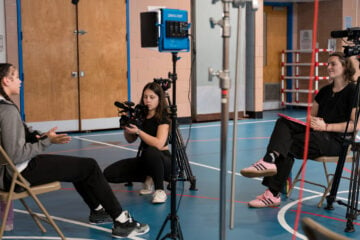Radiotopia’s Kickstarter funds will support internships, health care and more podcasts
Public Radio Exchange’s podcast network Radiotopia has raised $620,000 from 21,808 donors on Kickstarter, setting a record among publishing, radio and podcasting projects that have used the crowdfunding platform.
“We were dazzled by the response,” said PRX CEO Jake Shapiro. “It shows how dedicated the listeners are to the shows. And it means we’re going to be shipping out a lot of T-shirts.”
After reaching its initial goal, the campaign achieved stretch goals as well. One enabled Radiotopia to add four shows to its lineup. Three are hosted by women, addressing a gender imbalance among popular podcasts.
With the addition of those three programs and one more podcast, Mortified, Radiotopia will expand its total offerings to 11. PRX will also use some of the money for a pilot development fund aimed at adding more shows in the future.
Radiotopia launched its first season Feb. 4, intending to create a package of shows that would be easier to promote to sponsors than individual podcasts. Under the arrangement with PRX, the producers retain ownership of the programs and share in earnings. Shows at launch included 99% Invisible, Fugitive Waves, Love + Radio, Radio Diaries, Strangers, Theory of Everything and The Truth.
The first season was funded largely by a $200,000 grant from the Knight Foundation, sponsorship from MailChimp and a 2013 Kickstarter campaign for Radiotopia founder Roman Mars’s 99% Invisible.
For the second season, the original shows will use the funding as follows:
- Strangers will release biweekly episodes starting in March;
- The Truth will commission a story from Danny Rubin, the writer of Groundhog Day;
- Theory of Everything will step up to three episodes a month and add a paid intern;
- Love+Radio will commission an original score;
- Radio Diaries will move to biweekly releases;
- 99% Invisible will raise pay and subsidize health care for staffers; and
- Fugitive Waves will produce additional podcast-first episodes.
The success of the latest Kickstarter campaign bodes well for Radiotopia’s sustainability in years to come, Shapiro said, making up one leg of the “three-legged stool” of successful public media funding. Underwriting, such as the MailChimp sponsorship, and foundation support are the other two legs.
“We think this is a highly sustainable model,” Shapiro said. “It’s still nascent and will require real effort going forward, but we think it is sustainable.”
PRX will manage the Kickstarter funds on behalf of the network in its role as Radiotopia’s fiscal agent. It has yet to determine how much it will devote to developing pilots, Shapiro said.
“We have talked about it, but it’s not fully fleshed out yet because we weren’t sure we would get to that point in the funding,” Shapiro said. “We thought it would be important, even if it’s a small fund, to show that that’s what we want to do — cultivate new voices.”
Season two of Radiotopia, covered by the campaign, is scheduled to start in February. The kickoff will coincide with a redesign of PRX’s website, budgeted independently of the Kickstarter funds and intended to better serve listeners who visit the site in search of content.
“Millions of people have come to the site, but it hasn’t been designed for them,” Shapiro said. “It was designed for program directors and producers primarily, and we want to change that to improve the listener experience.”






